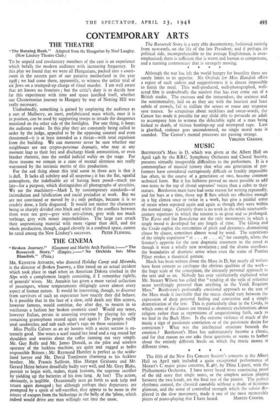THE CINEMA
"Broken Journey." (Gaumont and Marble Arch Pavilion.)—" The Roosevelt Story." (Empire.)---6, No Orchids for. Miss Blandish." (Plaza.) MR. KENNETH ANNAKIN, who directed Holiday Camp and Miranda, is the director of Broken Tourney, a film based on an actual incident which took place in 1946 when an American Dakota crashed in the Alps with a complement largely consisting, if I remember rightly, of generals' wives. Mr. Annakin has given a more varied collection of passengers, whose temperaments obligingly cover almost every aspect of human nature. It would be interesting, though, to discover from survivors of such an experience how exactly they did behave. Is it possible that in the face of a slow, cold death any film actress, however famous, would contiriue, day after day, to mourn in so vociferous a fashion her broken cosmetic case? Would any tenor, however Italian, persist in annoying everyone by playing his only remaining gramophone record again and again ? Do people really steal sandwiches and nab each other's rugs on these occasions ?
Miss Phyllis Calvert as an air hostess with a secret sorrow is ex- tremely good. She wears a scarf round her head and a rug round her shoulders and worries about the coffee running out very simply. Mr. Guy Rolfe and Mr. James Donald, as the pilot and wireless operator of the luckless machine, are quiet and rugged as befits responsible Britons • Mr. Raymond Huntley is perfect as the acidu- lated lawyer and Ar. David Tomlinson charming as his feckless brother. Mr. Francis Sullivan, Miss Margot Grahame and Mr. Gerard Heinz behave dreadfully badly very well, and Mr. Grey Blake, peevish to begin with, makes, thank heavens, the supreme sacrifice by yielding up the batteries of his iron lung. At last! The action, obviously, is neglible. Occasionally men go forth to seek help and return again damaged ; but although perhaps their departures are prompted by a spirit of self-sacrifice, they appear to be more in the nature of escapes from the bickerings in the belly of the 'plane, which indeed would drive any man willingly out into the snow. The Roosevelt Story is a very able documentary, fashioned entirely from newsreels, on the life of the late President, and if perhaps its political side, incomprehensible to the average Englishman, is over- emphasised, there is sufficient that is warm and human to compensate, and a running commentary that is strangely moving.
a
Although the war has left the world hungry for brutality there are surely limits to its appetite. No Orchids for Miss Blandish offers a repast of such sadism and suggestiveness it is almost impossible to finish the meal. This well-produced, well-photographed, well- acted film is undoubtedly the nastiest that has ever come out of a British studio. The excesses and the innuendoes, the sexiness and the sentimentality, laid on as they are with the heaviest and least subtle of trowels, fail to titillate the senses or rouse any response save nausea. So scrupulous about necklines and swear-words, the Censor has made it possible for any child able to persuade an adult to accompany him to witness the delectable sight of a man being kicked to death, of vicious beatings-up and attempted rape. Lust is glorified, violence goes uncondemned, no single moral note is sounded. The Censor's mental processes are passing strange.
VIRGINIA GRAHAM.


































 Previous page
Previous page